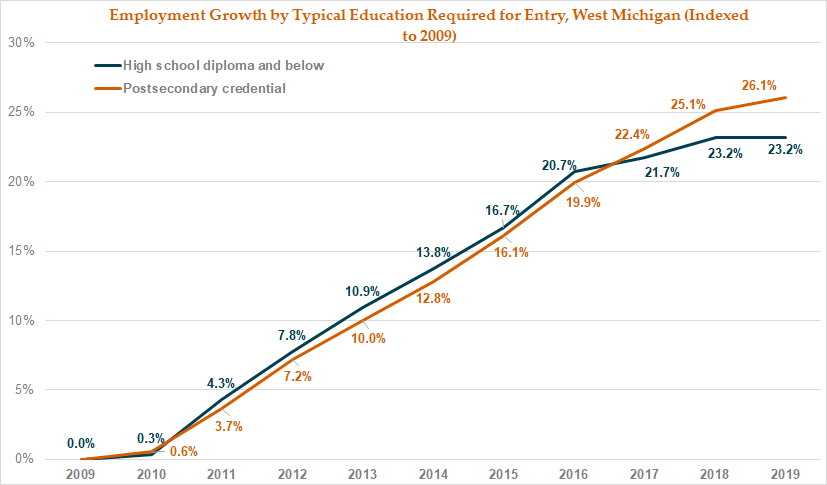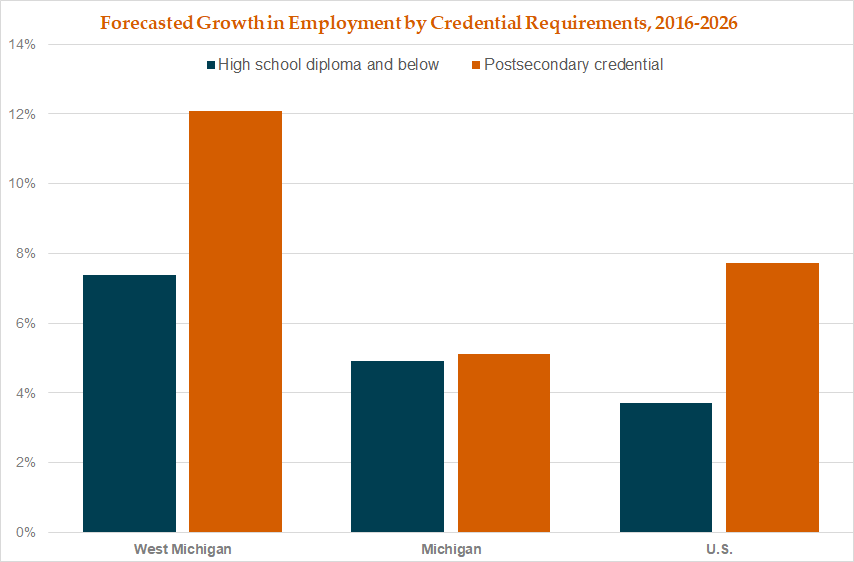Note: This is the first in a series of posts analyzing the nine key strategies cited in our 20/20 Vision Report.
We will not achieve our region’s talent objectives without widespread recognition of the crucial role that education plays in a modern, knowledge-based economy.
This importance is reflected by the priority we gave to the first of our nine strategies in the 20/20 Vision Report:
Strategy 1: Raise awareness of education and lifelong learning as essential tools to success.
As stated in the report: “We will know we have moved from good to great when employers have access to educated and skilled talent to fulfill current and emerging needs. In this better future, everyone will have access to education and training that is aligned to the needs of employers.”
We do not get to that better future, however, without first recognizing the importance of a post-secondary education and training in today’s knowledge-based economy. Fortunately, there is plenty of evidence to make that case.
Outpacing the state and nation
Research for our regular Talent Demand Reports allows Talent 2025 to document employment growth for various education levels, and to make data-based projections for the future.

Two conclusions are obvious. The first is that data shows employer demand for postsecondary credentials already has eclipsed that for high school diplomas. The second is that this trend is only going to accelerate, particularly in West Michigan.

By comparing typical entry-level educational requirements for each occupation to the forecasted number of job openings anticipated to occur through 2026, we can project the number of job openings anticipated to occur at each level of education over the next 10 years. The data anticipates West Michigan will see a 10-year increase (2016-2026) of 12.1% for employment requiring a postsecondary credential. That far outpaces forecasts for statewide growth of 5.1% and national growth of 7.7%.
It is just as important to compare where the job growth will occur in the region. The 12.1% increase in jobs requiring a postsecondary credential outpaces the increase in jobs that require only a high school diploma, which is predicted to grow in West Michigan by only 7.4%.
Clearly, postsecondary education and training – including lifelong learning for adults already in the labor force – is essential to our success in a modern economy.
Employability skills
Fortunately, many stakeholders in our region already have recognized the value of lifelong learning and importance of a well-educated workforce.
A knowledge-based economy will place an increasing emphasis on employability skills in addition to traditional expectations of academic proficiency. As automation and technology play larger roles in the modern workplace, employers want candidates who can problem-solve and adapt to new situations as they arise within their careers.
These employability skills include:
- Initiative and perseverance,
- Responsibility,
- Teamwork and citizenship,
- Customer service,
- Problem solving and ingenuity,
- Flexibility and resilience,
- Attendance and punctuality, and
- Being drug and/or crime free.
One example of a West Michigan education system adapting for the future is Northview High School’s MiGPS, which is developing employability skills among students from middle to high school and providing them with more robust career guidance. Programs like FuturePrep’d, in Ottawa County, offer a link between classroom teaching and workplace relevance through content, curriculum and experiences beginning in the sixth grade.
Aligning priorities
While we are seeing individual successes like these, it is essential to have a regionwide, aligned recognition of the importance of postsecondary education and lifelong learning.
It is true we are on track toward one of our central goals, that at least 64% of all West Michigan residents age 25 and older have a postsecondary credential by 2025. This goal is even more ambitious than the current statewide goal set by Gov. Gretchen Whitmer of 60% by 2030.
However, new data indicates we may need to set our sights even higher, to 70%.
The only way to get there is through region-wide recognition of the importance of postsecondary education and lifelong learning. This is how we can help the students and workers of today prepare for the workforce of tomorrow.


